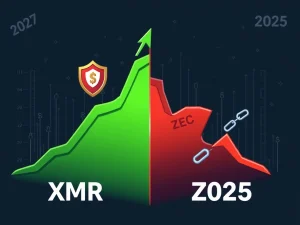Unlock Crypto Regulation Clues: US Gov’t Actions Under Trump

The cryptocurrency world is buzzing with anticipation, trying to decipher the future of digital asset regulation in the United States. Recent actions from the US government, particularly under the Trump administration, are offering intriguing clues about upcoming crypto regulation. From dropped investigations to policy reversals, these moves could signal a significant shift in how digital currencies are governed. Let’s dive into the details and explore what these developments might mean for the crypto industry.
Decoding US Government Actions: A New Era for Crypto Regulation?
The initial phase of the Trump administration witnessed a series of events that are now being closely analyzed for insights into future crypto regulation. While some critics dismissed these actions as mere symbolism, a closer look reveals a potential strategic shift in enforcement and rulemaking that could reshape the operational landscape for crypto businesses in the US.
One of the most immediate concerns for the crypto industry has been access to traditional banking services. The previous administration’s policies, often referred to as “Operation Chokepoint 2.0” in crypto circles, led to widespread debanking of crypto firms. This contentious issue became a rallying point for industry advocates, highlighting the urgent need for regulatory clarity and support for banking access.
How Trump’s Approach is Opening Up Banking to Crypto
Addressing the crypto industry’s debanking problem became a priority for the Trump administration right from the start. Within days of taking office, a series of directives were issued aimed at reversing policies that hindered banks from engaging with cryptocurrencies. Let’s break down these key actions:
- Staff Accounting Bulletin 122 (SAB 122) Repeal: This directive rolled back the SEC’s SAB 121, which had made it onerous for banks to hold cryptocurrencies on their balance sheets. By repealing this, the administration signaled a move towards easing restrictions on banks’ crypto involvement.
- OCC Interpretive Letter 1183: The Office of the Comptroller of the Currency (OCC) issued this guidance, effectively undoing Letter 1179. The previous letter required banks to seek OCC permission for crypto-native activities like custody, stablecoin reserves, and node validation. Letter 1183 streamlined this process, reducing bureaucratic hurdles.
- FDIC Guidance Rescission: The Federal Deposit Insurance Corporation (FDIC) followed suit by rescinding FIL-16-2022 from the Biden era. This earlier rule mandated FDIC-supervised institutions to notify the agency before engaging in crypto activities, adding another layer of compliance.
- Reputational Risk Stance: Acting FDIC Chair Travis Hill publicly stated that banking regulators should not use “reputational risk” as a basis for criticizing banks working with crypto firms. This statement further reinforced the administration’s intent to foster a more welcoming environment for crypto-banking access.
While the full impact of these policy changes may take time to materialize due to the nature of large banking institutions, the direction is clear. The US government actions under Trump are paving the way for significantly improved banking access for cryptocurrency companies.
The Significance of Dismissed Crypto Cases by the SEC
Another striking development has been the near-universal dismissal of pending SEC cases involving cryptocurrency defendants. While these dismissals don’t set formal legal precedents, they strongly suggest a shift in the SEC’s enforcement priorities and interpretation of crypto regulation. Here’s a list of notable cases that were either fully dropped or settled without admissions of wrongdoing:
| Date | Company | Case Details |
|---|---|---|
| Feb. 27, 2025 | Coinbase Inc. | Unregistered sale of securities |
| March 3, 2025 | Payward, Inc. (Kraken) | Unregistered exchange operation |
| March 25, 2025 | Ripple Labs, Inc. | Unregistered securities offering |
| March 27, 2025 | Cumberland DRW LLC | Unregistered broker-dealer activity |
| March 27, 2025 | Consensys Software, Inc. | Unregistered staking-as-a-service |
These cases predominantly revolved around allegations of unregistered securities offerings and operations. The common thread is that these allegations would only hold if the underlying cryptocurrencies were classified as securities. The dismissal of these cases hints at a potential re-evaluation of this classification by the SEC, suggesting a less stringent approach to crypto regulation.
Cases on Hold: What Does the Pause Mean?
Beyond dismissed cases, several others have been put on hold, indicating a potential move towards eventual dismissal. These include cases against major players like Binance, Changpeng Zhao (CZ), Tron Foundation, Justin Sun, and Gemini Trust Company. While some of these cases involve fraud allegations in addition to unregistered operations, the pause itself is noteworthy. It suggests a conciliatory approach from the US government actions, even in more complex situations.
SEC Investigation Drops: A Sign of Changing Tides?
Furthermore, reports indicate that the SEC has ceased ongoing investigations into several crypto firms following Trump’s inauguration. These investigations targeted companies like Robinhood Crypto, OpenSea, Uniswap Labs, and Yuga Labs, focusing on NFTs and intermediary broker roles. The termination of these investigations, coupled with the dismissed cases, paints a consistent picture of a potentially significant shift in SEC enforcement strategy and crypto regulation.
What Do These Dismissals and Pauses Really Tell Us About Crypto’s Future?
While no single dismissal constitutes a formal declaration of legality for specific crypto activities, the collective impact of these US government actions is undeniable. The SEC’s decisions to drop charges related to operating as brokers, dealers, exchanges, and issuing crypto tokens are consistent with a view that cryptocurrencies themselves may not be classified as securities under existing laws. Moreover, the SEC has explicitly stated that memecoins, proof-of-work mining, and asset-backed stablecoins are generally outside the scope of securities laws. This broad stance, combined with the pattern of dismissals, strongly suggests that secondary market sales of cryptocurrencies, NFTs, and staking services might also fall outside traditional securities regulations.
The “Flood the Zone” Strategy and Its Implications for Crypto
The flurry of policy changes and case dismissals might appear overwhelming or even random at first glance. However, drawing a parallel to the “Flood the Zone” strategy popularized by Steve Bannon, it’s possible to see a deliberate and comprehensive approach emerging. Each action, when viewed in isolation, might seem minor. But collectively, these US government actions represent a potentially transformative shift in the US government’s approach to crypto regulation.
Banks are now significantly freer to engage with cryptocurrencies. Companies previously entangled in litigation are now liberated, potentially paving the way for new entrants into the market. The SEC is proactively issuing guidance clarifying the boundaries of its regulatory purview. This dramatically improved regulatory environment is creating clearer, legally viable pathways for crypto businesses to operate within the US.
Key Takeaways:
- Improved Banking Access: Trump administration policies are actively dismantling barriers to banking access for crypto firms.
- Reduced SEC Enforcement: Dismissed cases and halted investigations suggest a less aggressive SEC stance on certain crypto activities.
- Clarity on Non-Security Status: Actions indicate a potential shift towards not classifying many cryptocurrencies and related activities as securities.
- Emerging Legal Pathways: The regulatory landscape is becoming more defined, offering clearer legal avenues for crypto businesses.
In conclusion, while the future of crypto regulation is still evolving, the recent US government actions under the Trump administration provide compelling clues. These actions point towards a potentially more permissive and enabling regulatory environment for the cryptocurrency industry, a stark contrast to previous uncertainties. As the industry navigates this evolving landscape, staying informed and adaptable will be crucial for success.









